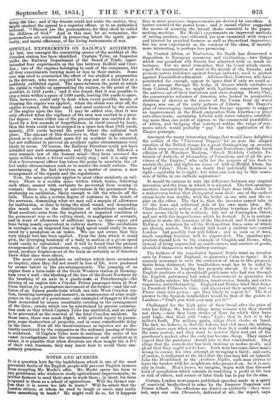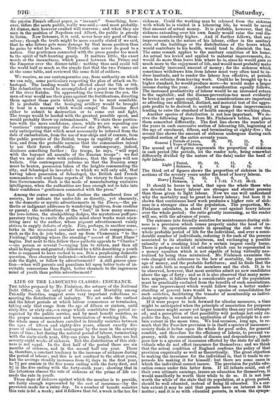NOTES AND QUERIES.
IT is a question how far the bashfulness which is one of the most prevalent faults of the English people will prevent English farmers from accepting Mr. Neches offer. Mr. Meohi opens his farm to ?ny gentleman who wishes-to study agricultural improvements; he invites Maniere to send their men to work there ; in short, his farm is opened to them as a school of agriculture. Will the farmer con- fees that it is never too late to learn ? Will he admit that the London citizen, at whom he used to laugh or sneer, may really have something to teach? He might well dose, for it happens-
that in most processes improvements are devised by outsiders. A barber contrived the power-loom ; and a casual visitor suggested the means of securing the lateral shake essential to the paper- making machine. Mr. Mechi's experiments on improved methods of raising produce, once ridiculed, are now examined with iespeet and interest by practical farmers as well as theoretical improvers ; but his new experiment on the candour of the class, if morally more interesting, is perhaps less promising.
In Central Africa, at Timbuctoo, Dr. Barth has discovered a disposition to European commerce and civilization,—two things which our quondam ally Russia has admitted with so much re- luctance. For we must remember, that the Court which encou- raged the accumulation of mud at the mouth of the Danube, and protects native indolence against foreign industry, used to protest against Frenchified refinement. All travellers, however, who have penetrated far enough, appear to agree that if only we could se- , cure a passage through the hedge of disease which excludes us I from Central Africa, we might with legitimate commerce tempt I the natives out of their barbarism and slave-dealing. Henry Clay, the conservative reformer of America, who looked to prospective abolition of slavery as the rescue of the Union from its worst danger, was one of the early patrons of Liberia. Mr. Thayer's plan of encouraging immigration from Europe appears to suggest an improvement in the Black emigration from America—a great anti-slave-trade, sustaining Liberia with sister colonies, establish- ing more than one point of ingress to the commercial possibilities of Africa, and bringing that continent within the range of com- merce which would probably " pay " for this application of the Thayer principle.
Amongst the many interesting things that would have delighted I the author of the "Universal Prayer," let us note the alleged ' sanction of the British troops for a great thanksgiving on account of their own recovery of health on Mount Pentelicus ; and the loyal effusion of M. Maximos Mazlum, "Greek Melchite Catholic Pa- triarch of Antioch, of Alexandria, of Jerusalem, and of all the pro- vinces of the Empire," who calls for the prayers of his flock to sustain the just and righteous cause of Abol-ul-Medjid Khan, the head of Islam! There is no doubt that politically Maximos is right—equitably he is right ; but what can sect say to this confu- sion of faiths in one catholic aspiration?
It would be curious to note the difference between any original invention and the form in which it is adopted. The first spinning- machine invented by Hargreaves would have done little credit to a maker even before that ill-requited man died : one of the earliest steam-boats was double, with the boiler on one side and the en- gine on the other. The fact is, that the inventor cannot take in all the laws and collateral aids of his own main idea. Mr. ' Charles Pearson's notion of a Metropolitan terminus for all rail- ! ways seems likely to be realized; but not at Farringdon Street, ■ and not with the magnificence which he desired. It is in contem- plation to make the terminus of the Blackwall and North London Railway a terminus for all the Metropolitan lines, some of which are already united. We should still want a railway into central London : but possibly that will follow ; and as soon as it does, much omnibus business will be superseded. The omnibus-pro- prietors should look to the example of Chaplin and Horne, who, instead of being superseded as coach-owners and carriers of goods, identified themselves with railway-carriage.
The holders of the repudiated Spanish Bonds want an interfer- ence by France and England, to guarantee Cuba to Spain! It is scarcely necessary to note the confusion of ideas in this proposal. Spain being dishonest, the bondholders want her to be aided by alien countries in keeping her property abroad. It is as if the English creditors of a spendthrift gentleman who had run through his English patrimony had asked Government to guarantee his , West India estates ; his liabilities, insolvencies, frauds, and extra- vaganoies, notwithstanding. England and France tried that dodge in President Fillmore's time, and discovered their mistake just as Pierce came into power : are they likely to repeat it ? The best answer to the Spanish bondholders would be that of the gamin de Londres—" Don't you wish you may get it ? "
Challenged for the high price of their bread after the price of corn has fallen, the bakers allege many reasons why they should not abate,—that they have stocks of flour for which they have paid high; that flour still "rules" high'; that in fact it is the miller's fault. The millers, again, allege their stocks on hand. The fact, we believe, is, that the bakers, and still more the millers, bought more corn when corn was dear than they could Bell during the same period; and they want to recover their cost out of the purchaser's pocket, after the corn has become cheap. They cannot expect that the purchaser should join in that combination. They allege that the corn-dealer has been making an undue profit, and plead that they ought not to lose. Each man has some other man's wrong to excuse his own attempt at wronging a third ; and each, of course, is indignant at the idea that the loss may fall on himself. Like the Hunchback in the Arabian Nights, each man strives to leave the burden with his neighbour, who passes it on. So it is usu- ally in trade. Men's losses, we imagine, begin with that diseased kind of speculation which consists in snatching a profit at the loss or risk of others, and sooner or later trade has to pay for its sin& Certain London newspapers published speeches made in a spirit of convivial brotherhood in arms by the Emperor Napoleon and Prince Albert. The effusions are denied on authority : they were not, says our own Chronicle, delivered at all; the report, says-
the precise French official paper, is "inexact." Something, how- ever, infers the mute public, really was said ;—and most probably. At dinner, men however exalted will converse ; and when they are men in the position of Napoleon and Albert, the public is greedy to listen. Now, listeners, it is said, never hear any good of them- selves ; though the truth might be more exactly stated if we said, that he idio listens gets more damage by that mean position than he gains by what he hears. Tittle-tattle can never do good to a nation. Our gentlemen connected with the press pander too much to the spirit of tuft-hunting gossip. It matters little, the exact words or the inexactness, which passed between the Prince and the Emperor over the dinner-table : nothing thus said could tell the world half so much as the simple fact that the two Princes sat at the same table, and reviewed the same field of soldiers.
We receive, as our contemporaries say, from authority on which we can rely, some particulars respecting the plan of attack on Se- bastopol. The landing would be effected about the 7th or 8th. The debarkation would be accomplished at a point near the mouth of the river Katcha. On approaching the town from the sea, the men-of-war would use their guns against the fortifications, directing them against those parts which appear to be most assailable. It is probable that the besieging artillery would be brought to bear in a manner which would compel the Russian fleet either to submit to destruction or to come out and fight. The troops would be landed with the greatest possible speed, and would probably throw up intrenchments. We state these particu- lars with the more confidence, since, while we are repeating our "cautious" contemporary the Journal des Debats, we are also only anticipating that which must necessarily be inferred from the date of embarkation, from the use of war-ships and of cannon, from the public practice of the British troops in rapidity of debarka- tion, and from the probable surmise that the commanders intend to use their forces effectually. Our contemporary, indeed, discloses something further : the troops, he says, "will repel with the bayonet all assaults of the Russian troops" : we feel that we may also state with confidence, that the troops will use bullets. Our contemporary informs us that the Russian army must be beaten, possession taken of the heights commanding the city, and Sebastopol be invested : to which we will only add, that having taken possession of Sebastopol, the British and French commanders will send home reports of the victory to their respec- tive Governments. Such is the mode of manufacturing exclusive intelligence when the authorities are base enough not to take into their confidence "gentlemen connected with the press."
Among the crater mouths that disclose the smothered fires of society, few indicate the under-life so directly, yet obscurely, as the domestic or mystic advertisements in the Titnes,—the pa- thetic or indignant addresses to wandering fugitives, from creditor or parent ; the notifications of the "lost," in how many senses ; the love-letters, the stockjobbing dodges the mysterious puff-pre- paratory trying to excite the public mind about works most unex- citing save to the author, whose piquant advertisement vainly strives to supply defects of style. Fire, perhaps, in another sense, lurks in the occasional oracular notices to club companions — such as the fen de joie today, east up from Chamounix "to the Fielding," notifying where the standing" ascent of Mont Blanc" begins. But next to this follow three pathetic appeals to "Charles" —one person or several ?—urging him to return, and then all shall be forgiven and granted ; followed by a fifth describing a youth who is supposed to have rushed to sea. It is a perplexing domestic question' thus obscurely indicated—whether consent should pre- cede the flight, or follow by advertisement ? A still graver ques- tion—when will parents and guardians hit upon better tests of in- evitable concessions than flight, better channels to the ingenuous mind of youth than public advertisement ?



























 Previous page
Previous page